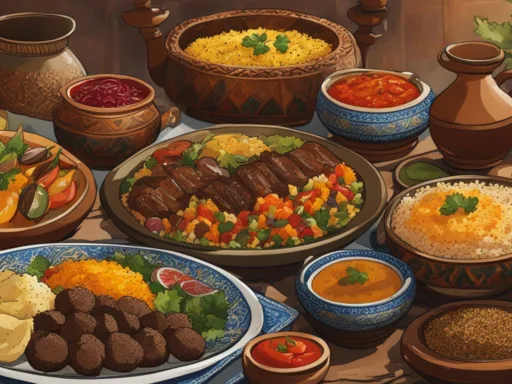Did you know that Bulgaria is one of the oldest wine producers in the world, with a viticultural history that spans over 6,000 years? But the country’s ancient traditions aren’t confined to the vineyard; they extend boldly into the kitchen. Bulgarian food culture is steeped in a rich tapestry that threads through millennia, offering a Bulgarian culinary experience like no other. Each traditional Bulgarian dish embodies the spirit of the nation, telling a story that is both ancient and vibrantly alive. As you explore Bulgarian gastronomy, it’s not just about savoring flavors—it’s about immersing yourself in the lore and love of a cuisine that has been shaped by the hands of history.
Key Takeaways
- Grasp the historical significance of Bulgarian gastronomy as one of the most ancient yet evolving cuisines.
- Discover the essence of traditional Bulgarian dishes that have been passed down through generations.
- Experience a blend of flavors and cultural influences in every bite of Bulgaria’s diverse culinary offerings.
- Realize the potential for exploration within Bulgarian food culture, beyond just the consumption of dishes.
- Understand the unique fusion of historical significance and modern taste that shapes the Bulgarian culinary experience.
- Prepare to dive into not just a meal, but a rich cultural journey as you explore Bulgarian gastronomy.
Introduction to Bulgarian Culinary Heritage
Bulgaria’s rich history is reflected in every aspect of its culture, especially its cuisine. Discovering authentic Bulgarian cuisine is like unearthing a hidden treasure trove of flavors. The country’s diverse landscape, from its mountainous regions to its coastal areas, has contributed a multitude of influences that have shaped its distinct culinary identity. Bulgarian food traditions are an expression of the nation’s soul, preserving time-honored techniques and recipes passed down through generations.
Among the jewels of this gastronomic legacy are the traditional Bulgarian dishes that blend simplicity with flavor. They are a testament to Bulgaria’s agricultural abundance and the pivotal role that food plays in its cultural celebrations and daily life. Whether it’s a hearty banitsa pastry enjoyed as a comforting breakfast or the conviviality of sharing a Bulgarian salad with friends, each dish offers a window into the country’s storied past and the Bulgarian way of life.
The Bulgarian table is characterized by a variety of savory and sweet dishes, each carrying a story of its origin and importance. Across the nation, from the quaint villages to the bustling city markets, you will find vendors and chefs alike championing the nation’s economic gastronomy—offering dishes that are as much about flavor as they are about the communal experience of sharing a meal.
To savor authentic Bulgarian cuisine is to embark on a historical journey, indulging in a legacy of flavors that have not only stood the test of time but continue to evolve and inspire. As we delve deeper into the Bulgarian culinary landscape, one becomes ever more attuned to the heart and passion behind every recipe — ingredients meticulously chosen, dishes crafted with care, and traditions proudly preserved.
Bulgarian Cuisine Discovery: A Tapestry of Flavor
The rich and savory journey through traditional Bulgarian dishes is a vibrant reflection of the country’s vast geographic landscape and dynamic history. An exploration of Bulgarian food culture reveals a unique fusion where must-try Bulgarian recipes paint a picture of a people shaped by varied influences and the passage of time.
Impact of Geography and History on Bulgarian Cuisine
Bulgaria’s position at the crossroads of Europe and Asia explains the diverse range of flavors found in its national cuisine. The convergence of Mediterranean, Slavic, and Middle Eastern gastronomic practices has influenced Bulgarian cooking methods and ingredients, creating dishes that resonate with a sense of place and the stories of generations past.
Essential Ingredients in Bulgarian Cooking
Fundamental to the Bulgarian pantry are products cultivated from the fertile soils and favorable climate conditions. This bounty yields an astonishing array of fresh vegetables, herbs, and fruit, which serve as the backbone for many staple dishes. Bulgarians also take pride in their dairy produce, particularly the varieties of cheese and yogurt, each with its own regional twist, revealing the importance of pastoralism in the nation’s agricultural practices.
Influence of the Ottoman Empire on Bulgarian Dishes
The hundreds of years under Ottoman rule introduced a wealth of spices and cooking techniques that have become entrenched in Bulgarian gastronomy. This period brought about the incorporation of fragrant spices and slow-cooking methods, prominently displayed in dishes that continue to be savored to this day. The result is an enchanting culinary repertoire, deeply entrenched in history yet responsive to contemporary tastes.
Below is a table that showcases the quintessential components that construct the essence of Bulgarian food, embodying the country’s agricultural wealth and historical melange:
| Ingredient | Culinary Use | Historical Influence |
|---|---|---|
| Fresh vegetables (tomatoes, cucumbers, peppers) | Base for salads like Shopska Salata | Native produce utilized since ancient times |
| Bulgarian yogurt | Foundation for cold soups and sauces | Nomadic traditions perfected over centuries |
| Cheeses (white brine cheese, Kashkaval) | Main feature in Banitsa and other pastries | Dairy farming culture in the Balkans |
| Meats (lamb, pork, chicken) | Grilled, stewed, and roasted in main dishes | Practices adopted from the Ottomans and Thracians |

The Aromatic World of Bulgarian Spices and Herbs
Embarking on a culinary voyage across Bulgaria, one is immediately immersed in a world where the Bulgarian spices and herbs are as much a staple of the cuisine as the fresh produce that graces the country’s tables. The rich tapestry of Bulgarian food culture is intricately interwoven with the use of traditional herbs like summer savory (chubritsa) and spearmint (dzhodzhen), which bring to life the vibrant flavors inherent in traditional Bulgarian dishes.

Essential to the authentic taste of Bulgarian cuisine, these seasonings do more than enhance flavor—they tell the history of a people and their connection to the land. Let’s delve into some key spices and their applications:
- Paprika: Often used as a base in stews and meat dishes, lending a warm, smoky essence.
- Dill: A preferred herb in salads and yogurt-based cold soups, offering a unique tang and aroma.
- Sumac: With its tangy lemon flavor, it’s a staple sprinkle over salads and meats.
- Thyme: Adds depth to slow-cooked meals and is commonly combined with other herbs for rubs.
It’s not just the single herbs and spices but also the artful blends that define the zest of Bulgarian fare. Sharena sol, a colorful mix including salt, paprika, and fenugreek, is a prime example of a seasoning that Bulgarians regularly use to elevate the flavor profile of a multitude of recipes. By mastering the delicate balance of these spices, one can truly experience the vitality and essence of Bulgarian gastronomic delights.
From the bustling markets brimming with the fresh scent of locally harvested herbs to the lovingly prepared meals that grace every family table, the essence of Bulgaria thrives in its spices and herbs, making it an indispensable journey for any culinary enthusiast eager to explore true Bulgarian flavor.
Iconic Bulgarian Appetizers and Salads
In the realm of traditional Bulgarian dishes, the commencement of a meal typically heralds with fresh and vibrant salads. These starters are not just a prelude to the main courses, but a showcase of Bulgaria’s rich soils and the seasonality of its produce. An authentic Bulgarian culinary experience inevitably begins with the crunch of vegetables and the rituals of communal dining. One can traverse through the variety of appetizers which are made to awaken the palate and set the stage for the food journey ahead.
Tradition of Starting with a Fresh Salad
This customary opening of meals speaks volumes about the importance of fresh produce in Bulgarian culinary experience. Each ingredient is a testimony to the fertility of the Bulgarian lands, offering crisp flavors that are as much a part of the dining experience as they are an embodiment of healthy living.
Sampling the Classic Shopska Salata
The Shopska Salata is an edible symbol of the national flag with the green of the cucumber, the white of the feta cheese, and the red of tomatoes artfully combined to create a dish that is as patriotic as it is delicious. This classic traditional Bulgarian dish is a staple that can be found on every Bulgarian table, representing more than just an appetizer—it’s a gesture of national pride.

Cold Yogurt Delights: The Unique Tarator
Then there’s the Tarator, a chilled soup that is particularly popular in the summer months. Its refreshing qualities make it an ideal choice for cooling down on a hot day. Bulgarian yogurt, known for its quality and probiotics, is a prime ingredient, blended with cucumbers, dill, garlic, and walnuts. This authentic Bulgarian cuisine is more than a culinary delight—it’s a testament to the ingenious use of simple, wholesome ingredients to craft dishes that are both nourishing and satisfying.
| Salad | Main Ingredients | Taste Profile |
|---|---|---|
| Shopska Salata | Cucumbers, tomatoes, onions, feta cheese, peppers, parsley | Crunchy, fresh, salty |
| Tarator | Bulgarian yogurt, cucumbers, garlic, dill, walnuts, water | Cooling, tangy, creamy |
The enjoyment of these traditional Bulgarian dishes goes beyond the burst of flavors they offer. These appetizers lay the groundwork for a memorable Bulgarian culinary experience, highlighting the regional diversity and the heartfelt hospitality exuded through authentic Bulgarian cuisine.
Traditional Bulgarian Main Courses
Delving into the traditional Bulgarian dishes, you can expect a rich Bulgarian culinary experience that harkens back to age-old cooking traditions. Each dish tells a story of the nation’s past, blending rustic charm with complex flavors. For enthusiasts of robust taste and heartwarming meals, here’s a selection of must-try Bulgarian recipes that are the heart and soul of the nation’s main courses.
Embark on a culinary journey with the revered Gyuvech, a slow-cooked symphony of meats and vegetables stewed to perfection in an earthenware pot. Meanwhile, Kavarma presents a tantalizing concoction of pork or chicken, emblematic of the Bulgarian skill in perfectly balancing meat with the richness of local spices.

On the grilled side of Bulgarian specialties, Kebapche reinvents the idea of minced meat with its unique blend of spices and herbs, grilled to create a succulent treat that’s both simple and flavorful. Furthermore, the skewered marvel known as Shishche will impress any meat lover with its tender, juicy cuts of seasoned meat, fire-grilled to smoky perfection.
| Main Course | Description | Key Ingredients |
|---|---|---|
| Gyuvech | Traditional stew baked in a clay pot, combining a variety of meats and vegetables. | Beef, onions, potatoes, carrots, tomatoes, eggplants, seasoning. |
| Kavarma | A sautéed dish often made with pork or chicken, featuring layers of flavor. | Pork or chicken, onions, mushrooms, peppers, wine, spices. |
| Kebapche | Seasoned minced meat with a distinctive shape, grilled to offer a smoky aroma. | Minced pork, beef or a mix, cumin, black pepper, garlic. |
| Shishche | Skewered and grilled cubes of meat, typically marinated to enhance the taste. | Lamb, chicken, or pork, peppers, onions, marinade. |
Whether it’s the tantalizing spices in every bite of Kebapche, or the comfort found in a warm serving of Gyuvech, these main courses exemplify the delectable essence of traditional Bulgarian cuisine. Each dish, a culinary masterpiece, awaits to offer a taste of Bulgaria’s rich history and flavorful heritage.
Delectable Bulgarian Desserts and Sweet Treats
As we weave through the tapestry of authentic Bulgarian cuisine, there is an inevitable delight in discovering the sweet note of Bulgarian desserts. Known for their luscious textures and flavors, these treats not only conclude a meal but also reflect the country’s rich cultural heritage and culinary creativity.
Indulgent Bulgarian Pastries
In Bulgaria, the art of pastry-making is an affair that ranges from the utterly sweet to the deliciously savory. Think of Banitsa, a flaky, layered pastry often filled with cheese and eggs that basks in its status as a national favorite, often enjoyed during breakfast or festive occasions. Sweet incarnations take the form of pastries filled with delightfully sticky preserves or fine nuts, encased in delicate phyllo dough, wafting the scent of coziness and tradition from every warm bite.
Bulgarian Yogurt: A Culinary Staple Turned Dessert
The fame of Bulgarian yogurt stretches far beyond its borders, lauded for its creamy texture and health benefits. But where it truly transforms is in the realm of desserts. The famed yogurt, when combined with honey and fruits, turns into a refreshing delight, presenting itself as a lighter dessert alternative that embodies the intrinsic simplicity and richness of traditional Bulgarian dishes. Whether it is the summer favorite Snezhanka or yogurt with walnuts and honey, every spoonful is a testament to the versatility of this cherished staple of authentic Bulgarian cuisine.
Vegetarian and Vegan Options in Bulgarian Cuisine
Embracing vegetarian Bulgarian dishes reflects a growing worldwide trend towards plant-based diets. Nestled within the rich tapestry of authentic Bulgarian cuisine, a surprising variety of greens and dairy alternatives provide an abundance of flavors for vegetarians and vegans alike. Bulgaria’s famous hospitality extends to all diners, with traditional recipes often having delightful plant-based versions.
Plant-Based Alternatives in Traditional Dishes
In the heart of Bulgarian food culture, vegetarian cuisine is far from an afterthought. Passionate about their produce, Bulgarian chefs and home cooks have created a plethora of dishes that maintain the authenticity and soul of the region’s culinary practices, now available to those who forgo animal products.
| Vegetarian Dish | Ingredients | Description |
|---|---|---|
| Stuffed Vine Leaves (Sarmi) | Rice, Herbs, Spices, Vine Leaves | These savory parcels are a traditional delight with a rice and herb filling, wrapped in tender vine leaves. |
| Bob Chorba (Bean Soup) | Beans, Carrots, Onions, Spices | A hearty soup rich in proteins and flavors, Bob Chorba offers comfort and warmth, seasoned with traditional Bulgarian spices. |
| Banitsa with Spinach | Filo Pastry, Spinach, Leeks | This flaky pastry filled with leafy greens showcases the versatility of Bulgarian rustic pies. |
| Mish-Mash | Tomatoes, Peppers, Onions, Eggs (optional) | Mish-Mash combines the freshness of garden vegetables in a light stew, sometimes without eggs for a vegan version. |
| Lentil Stew | Lentils, Vegetables, Paprika | A nutritious, vegan-friendly option, this Bulgarian lentil stew is flavored with the sweetness of paprika, embodying authentic local tastes. |
| Tarator (Cucumber Soup) | Cucumbers, Garlic, Walnuts, Yogurt (dairy or plant-based) | Often made with dairy-free yogurt, this cold soup is a summer staple that refreshes and nourishes. |
For those in pursuit of authentic and delectable vegetarian Bulgarian dishes, the country’s traditional menus provide a bountiful selection. Food is an integral part of Bulgaria’s national identity, and this includes the vibrant, vegetable-centric offerings woven into the fabric of everyday meals and festive occasions alike.
The Role of Festivals in Bulgarian Food Culture
Bulgarian food traditions are deeply intertwined with the country’s festive calendar, where ancient customs and gastronomical delights come together to create an unforgettable Bulgarian cuisine discovery. The vibrant festivals not only showcase traditional Bulgarian dishes but also reflect the nation’s spirit and rich cultural heritage. From the hearty soups and stews shared during the cold winters to the refreshing salads and grilled meats of summer festivals, every celebration is an opportunity to enjoy the vast array of delicacies that Bulgarian cuisine has to offer.
Celebrating the Kukeri Festival with Traditional Fare
The Kukeri Festival stands out as a spectacular display of Bulgarian folklore, where food plays a central role. Participants dressed in elaborate, handcrafted costumes parade through the streets, and traditional Bulgarian dishes are savored amidst the lively performances. The festival not only aims to scare away evil spirits but also to bring communities together over shared meals that have been passed down through generations.
Seasonal and Religious Culinary Traditions
Seasonal changes in Bulgaria herald distinct culinary practices that are tied to both the agricultural calendar and religious observances. Easter and Christmas are particularly noteworthy, each accompanied by specific dishes that highlight the Bulgarian culinary experience. These traditions not only provide a sense of continuity but also help to preserve the culinary arts that define Bulgaria’s vibrant food culture.
| Festival | Season | Traditional Dish |
|---|---|---|
| Kukeri | Winter/Spring | Banitsa |
| Easter | Spring | Kozunak (Easter bread) |
| Christmas | Winter | Kutya (Sweet wheat porridge) |
| Baba Marta | Early Spring | Martenitsa cookies |
Each festival and its related gastronomy contribute to the delightful journey of Bulgarian cuisine discovery, offering a window into the soul of Bulgarian food traditions. Whether it’s through understanding the symbolism behind each dish or indulging in the authentic taste, festivals provide a unique and enriching way to connect with traditional Bulgarian dishes and the warmth of the local community.
Experience Bulgarian Gastronomy: Dining and Cooking Classes
When you set out to explore Bulgarian cuisine, there’s an enchanting world of flavors and traditions awaiting you. It’s one thing to savor the mouthwatering dishes at a local restaurant, but to truly grasp the essence of Bulgarian gastronomy, one must also dive into the creation process. Immerse yourself in the country’s rich culinary scene by both dining out and participating in hands-on cooking experiences.
Relishing Bulgarian Flavours at Local Restaurants
Local eateries provide an authentic Bulgarian culinary experience, inviting you to taste quintessential dishes crafted with love and care. Here, memories are built not just on the palate but in the warm ambiance that encapsulates the spirit of Bulgaria’s communal dining culture.
Learning the Culinary Arts with Bulgarian Chefs
Learning from local chefs is an immersive journey into the heart of Bulgaria’s cherished recipes and cooking techniques. Discover secrets passed down through generations and bring a piece of Bulgarian culture back home with you.
| Culinary Experience | Description | Duration |
|---|---|---|
| Bulgarian Cooking Class | Hands-on preparation of traditional dishes under expert guidance | 3 Hours |
| Local Market Tour | Explore local ingredients and history behind Bulgarian cuisine | 2 Hours |
| Gourmet Dining Experience | Enjoy a curated multiple-course meal at a renowned Bulgarian restaurant | 2-3 Hours |
Whether you’re indulging in the vibrant tastes at a Sofia bistro or kneading dough in a Plovdiv cooking school, the spirit of Bulgarian hospitality ensures a memory that extends far beyond the table.
Pairing Bulgarian Wines with Local Cuisine
Embark on an explorative gastronomy journey with the nuanced flavors of Bulgarian wine, a perfect complement to traditional Bulgarian dishes. Renowned for its rich bouquet and exceptional quality, Bulgarian wine offers an enticing array of varietals that are as diverse as the country’s culinary offerings.
Each wine region in Bulgaria brings forward unique vintages that reflect the soul of the land. When paired with the local cuisine, they enhance the artisanal dining experience in a way that delights both connoisseurs and casual enthusiasts of wines and culinary arts alike.
| Bulgarian Wine | Traditional Dish | Tasting Notes |
|---|---|---|
| Mavrud | Kavarma | A robust red with spicy undertones, Mavrud is a complement to the hearty and aromatic stew. |
| Melnik | Shopska Salata | The earthy Melnik grape pairs well with the fresh vegetables and briny cheese of this iconic salad. |
| Dimyat | Grilled Fish | Dimyat’s floral notes and crisp finish balance the simplicity of perfectly grilled fish. |
| Rubin | Banitsa | A versatile red wine, Rubin varietal highlights the layers of flavors in the savory pastry. |
Experience the harmony between flavor profiles of Bulgarian wines and the rich, savory notes present in traditional Bulgarian dishes. The essence of explorative gastronomy lies in such pairings, which offer a deep appreciation of Bulgaria’s gastronomic heritage.
Conclusion
To explore Bulgarian gastronomy is to embrace a voyage rich with traditional Bulgarian dishes and an authentic Bulgarian culinary experience. From the vibrant hues and crunchy freshness of a Shopska Salata to the velvety indulgence of a creamy yogurt dessert, Bulgaria’s edible offerings reveal a culture deeply rooted in gastronomic tradition and innovation. Every savory stew and aromatic spice blend is a testament to the enduring heart of Bulgarian food culture.
This journey, punctuated by the mastery of local chefs and the warmth of Bulgarian hospitality, orchestrates a symphony of flavors that resonates with anyone seeking a truly unique culinary experience. The Bulgarian table, abundant and welcoming, symbolizes the nation’s sincere invitation to guests from near and far. Cooking classes, local dining, and the time-honored pairing of food with Bulgarian wine, chart a flavorful narrative from the first bite to the last toast.
Discovering and delighting in the multilayered stories behind each dish concludes not only a culinary adventure but also an immersion into the soul of Bulgaria. So, when presented with the opportunity to delve into the array of traditional Bulgarian dishes, one does more than just savor exquisite tastes—they participate in the continuation of a rich, delicious heritage.






